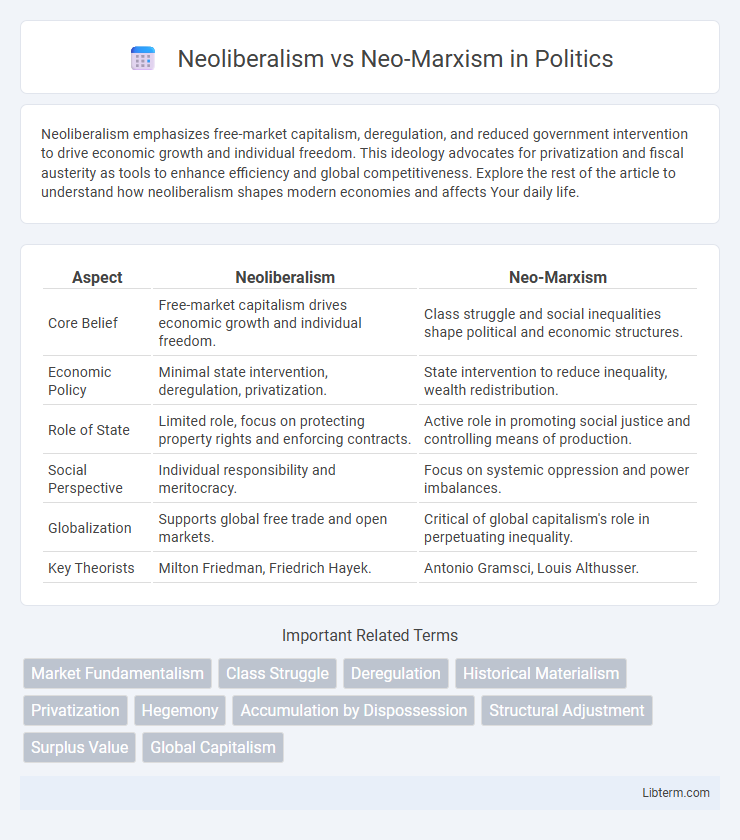Neoliberalism emphasizes free-market capitalism, deregulation, and reduced government intervention to drive economic growth and individual freedom. This ideology advocates for privatization and fiscal austerity as tools to enhance efficiency and global competitiveness. Explore the rest of the article to understand how neoliberalism shapes modern economies and affects Your daily life.
Table of Comparison
| Aspect | Neoliberalism | Neo-Marxism |
|---|---|---|
| Core Belief | Free-market capitalism drives economic growth and individual freedom. | Class struggle and social inequalities shape political and economic structures. |
| Economic Policy | Minimal state intervention, deregulation, privatization. | State intervention to reduce inequality, wealth redistribution. |
| Role of State | Limited role, focus on protecting property rights and enforcing contracts. | Active role in promoting social justice and controlling means of production. |
| Social Perspective | Individual responsibility and meritocracy. | Focus on systemic oppression and power imbalances. |
| Globalization | Supports global free trade and open markets. | Critical of global capitalism's role in perpetuating inequality. |
| Key Theorists | Milton Friedman, Friedrich Hayek. | Antonio Gramsci, Louis Althusser. |
Introduction to Neoliberalism and Neo-Marxism
Neoliberalism emphasizes free markets, deregulation, and limited government intervention to promote economic efficiency and individual entrepreneurship. Neo-Marxism critiques capitalism by focusing on power structures, class struggles, and social inequalities perpetuated by economic systems. The ideological divergence centers on neoliberalism advocating market freedom and neo-Marxism advocating structural change to address systemic exploitation and injustice.
Core Principles of Neoliberalism
Neoliberalism emphasizes free-market capitalism, deregulation, privatization, and reduced government intervention to foster economic growth and individual entrepreneurship. It advocates for open international trade, competitive markets, and the protection of property rights as foundations for prosperity. These core principles contrast with Neo-Marxism, which critiques capitalism's inequalities and calls for more collective ownership and state control over resources.
Foundational Concepts of Neo-Marxism
Neo-Marxism expands classical Marxist theory by incorporating the roles of culture, ideology, and social institutions in maintaining capitalist power structures, emphasizing the concepts of hegemony and social reproduction. It critiques neoliberalism's focus on free markets and individualism, highlighting systemic inequalities and the influence of global capitalism in perpetuating class domination. Key foundational concepts include Antonio Gramsci's notion of cultural hegemony, the Frankfurt School's critical theory, and the integration of superstructural elements affecting economic base relations.
Historical Development and Origins
Neoliberalism emerged in the mid-20th century as a response to Keynesian economics, emphasizing free markets, deregulation, and privatization rooted in classical liberalism traditions. Neo-Marxism developed in the post-World War II era, expanding Marxist theory to address modern capitalist structures, imperialism, and cultural hegemony, influenced by thinkers like Gramsci and the Frankfurt School. Both ideologies originated from critical reactions to economic and social conditions shaped by industrialization, global capitalism, and political shifts in the 20th century.
Economic Perspectives: Market vs. State Control
Neoliberalism emphasizes minimal state intervention, advocating free markets as the most efficient mechanism for resource allocation and economic growth. Neo-Marxism critiques this approach, highlighting state control and regulation as essential to address systemic inequalities and exploitative capitalist dynamics. Economic perspectives diverge as neoliberals prioritize deregulation and privatization, while neo-Marxists focus on redistributive policies and social ownership to achieve economic justice.
Social Equity and Class Analysis
Neoliberalism emphasizes market-driven policies and individual entrepreneurship, often prioritizing economic growth over social equity, which critics argue exacerbates class disparities. Neo-Marxism centers on structural class analysis, highlighting how capitalist systems perpetuate inequality and advocating for redistributive measures to achieve social equity. The clash between these frameworks revolves around whether addressing class disparities requires systemic transformation or market-based solutions.
Globalization: Contrasting Approaches
Neoliberalism views globalization as a pathway to economic integration, advocating for free markets, deregulation, and limited government intervention to promote global trade and investment. Neo-Marxism critiques globalization as a mechanism for capitalist exploitation, emphasizing how it perpetuates inequality and concentrates wealth in multinational corporations at the expense of proletarian and peripheral economies. These contrasting approaches highlight tensions between market-driven efficiency and systemic socio-economic disparities within global processes.
Critiques and Controversies
Neoliberalism faces critiques for promoting market deregulation and austerity measures that critics argue exacerbate income inequality and undermine social safety nets. Neo-Marxism is contested for emphasizing class struggle and economic determinism, which some say oversimplifies social dynamics and underestimates individual agency. Both frameworks generate controversy regarding their impact on global capitalism, with debates centered on neoliberalism's role in global economic crises and neo-Marxism's relevance in contemporary political analysis.
Contemporary Relevance and Influence
Neoliberalism emphasizes free markets, deregulation, and privatization, shaping global economic policies and international institutions like the IMF and World Bank in the 21st century. Neo-Marxism critiques capitalist structures, highlighting inequality and power imbalances, influencing social movements and academic discourse on globalization and social justice. Both frameworks continue to impact policy debates, with neoliberalism driving economic liberalization and neo-Marxism informing resistance to neoliberal policies and advocating systemic change.
Conclusion: Comparative Implications
Neoliberalism promotes free markets, privatization, and limited government intervention, emphasizing individual entrepreneurship and economic efficiency. Neo-Marxism critiques capitalist structures, highlighting systemic inequalities and advocating for collective ownership and social justice reforms. Comparing these frameworks reveals contrasting implications for policy-making: neoliberalism fosters market-driven growth while neo-Marxism prioritizes wealth redistribution and structural change to address socioeconomic disparities.
Neoliberalism Infographic

 libterm.com
libterm.com